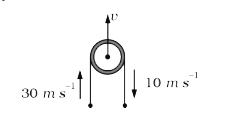The velocities of three molecules are 3v, 4v and 5v. Calculate their root mean square velocity.
√503v
√52v
72v
52v
The correct Answer is:A
To calculate the root mean square (RMS) velocity of three molecules with given velocities, we can follow these steps:
1. Identify the velocities of the molecules:
- The velocities are given as v1=3v, v2=4v, and v3=5v.
2. Use the formula for root mean square velocity:
- The formula for the root mean square velocity Vrms for n molecules is:
Vrms=√v21+v22+v23n
- Here, n=3 since there are three molecules.
3. Calculate the squares of the velocities:
- Calculate v21, v22, and v23:
v21=(3v)2=9v2
v22=(4v)2=16v2
v23=(5v)2=25v2
4. Sum the squares of the velocities:
- Now, add these squares together:
v21+v22+v23=9v2+16v2+25v2=50v2
5. Substitute into the RMS formula:
- Substitute the sum of squares into the RMS formula:
Vrms=√50v23
6. Simplify the expression:
- Factor out v2 from the square root:
Vrms=√503⋅v
7. Final result:
- Thus, the root mean square velocity is:
Vrms=√50√3⋅v=5√2√3⋅v
Final Answer:
Vrms=5√2√3⋅v
---
- The velocities are given as v1=3v, v2=4v, and v3=5v.
- The formula for the root mean square velocity Vrms for n molecules is:
Vrms=√v21+v22+v23n
- Here, n=3 since there are three molecules.
- Calculate v21, v22, and v23:
v21=(3v)2=9v2
v22=(4v)2=16v2
v23=(5v)2=25v2
- Now, add these squares together:
v21+v22+v23=9v2+16v2+25v2=50v2
- Substitute the sum of squares into the RMS formula:
Vrms=√50v23
- Factor out v2 from the square root:
Vrms=√503⋅v
- Thus, the root mean square velocity is:
Vrms=√50√3⋅v=5√2√3⋅v
Vrms=5√2√3⋅v
Topper's Solved these Questions
- THERMOMETRY THERMAL EXPANSION AND KINETIC THEORY OF GASESBOOK - DC PANDEY ENGLISHCHAPTER - THERMOMETRY THERMAL EXPANSION AND KINETIC THEORY OF GASESEXERCISE - Check point 14.4
25 Videos
- THERMOMETRY THERMAL EXPANSION AND KINETIC THEORY OF GASESBOOK - DC PANDEY ENGLISHCHAPTER - THERMOMETRY THERMAL EXPANSION AND KINETIC THEORY OF GASESEXERCISE - A Tacking it together
55 Videos
- THERMOMETRY THERMAL EXPANSION AND KINETIC THEORY OF GASESBOOK - DC PANDEY ENGLISHCHAPTER - THERMOMETRY THERMAL EXPANSION AND KINETIC THEORY OF GASESEXERCISE - Check point 14.2
20 Videos
- SUPERPOSITION OF WAVESBOOK - DC PANDEY ENGLISHCHAPTER - SUPERPOSITION OF WAVESEXERCISE - Level 2 Subjective
8 Videos
- THERMOMETRY,THERMAL EXPANSION & KINETIC THEORY OF GASESBOOK - DC PANDEY ENGLISHCHAPTER - THERMOMETRY,THERMAL EXPANSION & KINETIC THEORY OF GASESEXERCISE - Level 2 Subjective
9 Videos
Similar Questions
Knowledge Check
The root mean square velocity of the gas molecule is 300 m/s. What will be the root mean square speed of he molecule if the atomic weight is doubled and absolute temperature is halved ?
A300 m/sB150 m/sC600 m/sD75 m/sThe temperature at which root mean square velocity of molecules of helium is equal to root mean square velocity of hydrogen at NTP
A273∘CB273 KC246∘CD844 KN molecules each of mass m of gas A and 2 N molecules each of mass 2m of gas B are contained in the same vessel which is maintined at a temperature T. The mean square of the velocity of the molecules of B type is denoted by v2 and the mean square of the x-component of the velocity of a tye is denoted by ω2. What is the ratio of ω2/v2=?
A3:2B1:3C2:3D1:1
The velocities of our molecules are V, 2V, 4V and √2V, respectively. Their r.m.s. speed is
View SolutionThe root mean square speed of the molecules of an enclosed gas is 'v'. What will be the root mean square speed if the pressure is doubled, the temperature remaining the same?
View SolutionSelect the correct statement(s).
I. The velocity at which distribution of molecules is maximum is called most probable velocity
II. Most probable velocity of a gas is larger than root mean square velocity .
The correct option is:
View SolutionIf speeds of the four molecules of an ideal gas are v, 3v, 5v and 7v respectively, then the mean square speed of the molecules will be
View SolutionThe absolute temperature of the gas is increased 3 times. What will be the increases in root mean square velocity of the gas molecules?
View Solution


